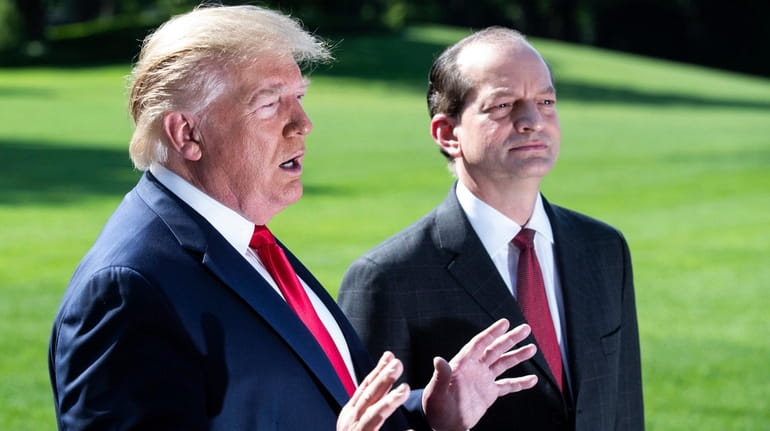Reversals without explanation are now routine White House practice

President Donald Trump speaks to reporters with Labor Secretary Alex Acosta on the South Lawn of the White House on Friday. Credit: EPA-EFE / Shutterstock / Michael Reynolds
Clumsy about-faces, like conspiracy stories, have become a staple of White House rhetoric and action.
Don't blame the staff for the resulting chaos. This has nothing to do with whomever may be press secretary or communications director at a given moment.
Labor Secretary Alex Acosta, under fire over his controversial role as prosecutor in the 2008 Jeff Epstein case, said Wednesday: “My relationship with the president is outstanding. He has, I think, made it very publicly clear that I’ve got his support."
“I keep reading about articles about my relationship between me and [Chief of Staff Michael] Mulvaney. And he called me this morning to say, in fact, that our relationship is excellent, too, and any article to the contrary are, in his words, ‘B.S.' ”
On Friday, however, Acosta quit — apparently without much resistance, if any, from the top. Trump said the decision came from Acosta, whose falling on his sword came more quickly than many expected.
Last year, Libby Schaaf, the mayor of Oakland, California, tipped off constituents about planned federal immigration raids. Trump called this a “disgrace.” A GOP congressman urged criminal penalties for such acts. Trump's then-ICE director, Tom Homan, said Schaaf was “no better than a gang lookout yelling ‘police!’ when a police cruiser comes in the neighborhood.”
On Friday, however, Trump announced that ICE operations to round up immigrants in the United States illegally were about to begin.
“If the word gets out, it gets out. It starts on Sunday,” Trump told reporters. “They’re going to take people out and they’re going to bring them back to their countries.”
Expect no explanations.
Trumpian turnarounds can take days, months, or even years.
In 2002, Trump told New York magazine that since-convicted sex predator Epstein was a “terrific guy” whom he had known for 15 years.
“He’s a lot of fun to be with,” said the president-yet-to-be. “It is even said that he likes beautiful women as much as I do, and many of them are on the younger side. No doubt about it — Jeffrey enjoys his social life.”
In the lingo of the old Nixon White House, that statement is no longer operative.
Trump said of Epstein on Tuesday that he “knew him like everybody in Palm Beach knew him.” Then he said: “I had a falling out with him. I haven’t spoken to him in 15 years. I was not a fan of his, that I can tell you.”
The two statements so far apart don't necessarily conflict. But the president wasn't about to connect the dots on a time line between "fun to be with" and "not a fan."
The disconnects and reversals affect public policy.
On Thursday, the White House announced that Trump has withdrawn his own plan to let patients using costly medications receive the rebates Big Pharma now pays to insurers and the middlemen known as pharmacy "benefit managers."
The impact of the move has yet to be seen as lawmakers negotiate new drug legislation.
Last month, Trump walked back a statement that he wouldn't use CIA informants to spy on North Korea's Kim Jong Un. Intelligence experts had criticized the remarks.
“No, it’s not what I meant," he said at a news conference. "It’s what I said and I think it’s different, maybe, than your interpretation."
Once again, the bottom line seems to be that if you don't like what the president or his top advisers are saying, just wait a while.

